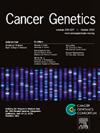肿瘤免疫治疗的新免疫靶点及信号转导研究
IF 2.1
4区 医学
Q4 GENETICS & HEREDITY
引用次数: 0
摘要
免疫疗法通过激活免疫系统来发现和消灭恶性肿瘤细胞,已成为恶性肿瘤治疗的创新手段之一。肿瘤免疫界面变得越来越复杂,使得新的免疫靶点和信号通路的识别成为一个持续的过程,从而基于改进的治疗策略。本文旨在阐明癌症与免疫系统之间的联系,重点关注免疫监视和免疫逃避机制。本文综述了ICI (CTLA-4、PD-1、PD-L1)、CAR-T细胞疗法和癌症疫苗等综合免疫治疗方法,同时也阐明了针对新的免疫检查点的先进疗法,包括TIM-3、LAG-3和TIGIT。JAK/STAT, MAPK和PI3K-AKT-mTOR通路在癌症进展和免疫治疗耐药方面进行了综述。这些途径的失调给新的治疗靶点的发现带来了希望。基因组学、蛋白质组学、免疫肽组学、单细胞质谱学、基于crispr的功能基因组学和生物信息学被认为是免疫靶标鉴定和癌症相关信号通路绘制的必要条件。本综述还考虑了一些新出现的问题,如肿瘤异质性、免疫相关不良事件(irAEs)和个性化治疗。描述这些障碍是为了促进对克服它们的方法的理解,并通过联合疗法提高免疫疗法的疗效。这意味着通过开发免疫靶点和途径的新知识,癌症的免疫精准医学可以大大提高疗效。本文章由计算机程序翻译,如有差异,请以英文原文为准。
Identification of new immune target and signaling for cancer immunotherapy
Immunotherapy has become one of the innovative treatments in malignancy as it activates the immune system to find and eliminate malignant cells. The tumor immunology interface has become increasingly intricate, making the identification of new immune targets and signalling pathways on which to base improved therapeutic strategies an ongoing process. This review, we goal to clarify the contacts between cancer and immune system with a focus on immune surveillance as well as immune evasion mechanisms. Comprehensive immunotherapeutic therapies are overviewed with ICI (CTLA-4, PD-1, PD-L1), CAR-T cell therapy, and cancer vaccines whereas, advanced therapies targeting new immune checkpoints are also elucidated including TIM-3, LAG-3, and TIGIT. The JAK/STAT, MAPK and PI3K-AKT-mTOR pathways are reviewed with regards to cancer progression and immunotherapeutic resistance. The dysregulation of these pathways gives hope for the identification of fresh targets for therapy. Genomics, proteomics, immunopeptidomics, single cell mass spectrometry, CRISPR-based functional genomics and bioinformatics are described as essential for immune target identification and for mapping of cancer relevant signaling pathways. This review also considers some emerging issues in the subject area like the tumor heterogeneity, immune-related adverse events (irAEs), and personalized treatment. These barriers are described to facilitate the understanding of ways to overcome them and increase the efficacy of immunotherapies through combination therapies. This means that by developing new knowledge of immunological targets and pathways, immunoprecision medicine for cancer could greatly enhance outcomes.
求助全文
通过发布文献求助,成功后即可免费获取论文全文。
去求助
来源期刊

Cancer Genetics
ONCOLOGY-GENETICS & HEREDITY
CiteScore
3.20
自引率
5.30%
发文量
167
审稿时长
27 days
期刊介绍:
The aim of Cancer Genetics is to publish high quality scientific papers on the cellular, genetic and molecular aspects of cancer, including cancer predisposition and clinical diagnostic applications. Specific areas of interest include descriptions of new chromosomal, molecular or epigenetic alterations in benign and malignant diseases; novel laboratory approaches for identification and characterization of chromosomal rearrangements or genomic alterations in cancer cells; correlation of genetic changes with pathology and clinical presentation; and the molecular genetics of cancer predisposition. To reach a basic science and clinical multidisciplinary audience, we welcome original full-length articles, reviews, meeting summaries, brief reports, and letters to the editor.
 求助内容:
求助内容: 应助结果提醒方式:
应助结果提醒方式:


